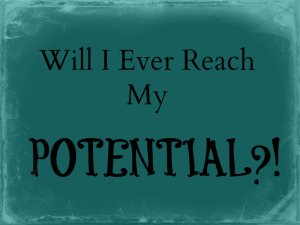Written by Rebecca Fraser-Thill

At college graduation festivities, one question bounces around repeatedly:
What if I waste my potential?
It's not spoken. Not even in a slightly reworded form. But it's there, in every graduate's insistence "...and in a couple of years I'll go to grad school," in every tight smile that doesn't involve the eyes, in every murmur along the lines of "it'll all work out."
I saw it time and again this past weekend as I attended my eleventh graduation at the selective college where I teach, and I suspect I'll see it for years to come.
I recognize the expression because I spent most of my twenties fearing I’d waste my potential. Intensely fearing it.
Thinking about it every time a room went quiet. Avoiding “successful” friends because they reminded me of it. Experiencing cardiovascular conditioning over it, without moving a single muscle.
Yet I never spoke this fear to anyone.
I’d picture myself old and gray, sitting on a porch talking to some faceless person, saying
“I could’ve been anything. I could’ve done so much with my life. Instead it all slipped by me.”
I came to hate the word “potential” itself, resenting it and all that it symbolized. “Potential” was the concentrated pill containing crushed-up remnants of my hoped-for adult life.
“Potential” also felt so darn patronizing. Like, “oh, there’s Georgia. She has so much potential," which 9 times out of 10 is said in that tone that implies “and she’s not doing a thing about it.”
I actually had a guidance counselor come up to me in high school and say, “I saw the colleges you applied to. Sure undershot your potential, didn’t you?”
Did I? Well maybe in his book I did, but not in mine. I applied to schools that were a genuine “whole person” fit for me.
Which is how, for the most part, I lived my 20s – making choices that resonated with something deep within me and that squared with a subtle awareness of my identity and deeply-held desires.
The rub was, I felt guilty about every single decision. Like I was “letting everyone down” by being true to me.
Like I was wasting my potential.
Smart people get PhDs, don’t they? Star college students get high-paying jobs, don’t they? Good daughters stay close to home, don’t they?
At my core, I knew the answer to all of those questions is not necessarily and that the answer for me personally was hell no.
Yet I felt pushed to live up to those stereotypical goals. Lest I waste my potential.
“Potential” felt like an imposition of another person’s storyline on top of my unfolding story. (Cue Sara Bareilles’ King of Anything).
I’m writing all of this not to complain but rather to say what I would have loved to tell the graduates this past weekend: you do not have to live in fear of wasting your potential.
The only person who is going to be sitting in your rocking chair at 90 years old is you. Not your mom. Not your dad. Not your teacher or brother or best friend’s aunt. YOU.
What will feel like wasting your potential then isn’t having failed to live up to their standards for you. It’s having lived someone else’s story.
So the real challenge before you? It's not mastering office politics nor jumping pointless grad school hurdles nor even keeping a job for more than three months.
It's simply figuring out what you want your story to be.
Which is great news because, deep down, that's something you already know.
We’d love to hear from you in the comments below: Do you think about possibly wasting your potential? If so, how do you combat those thoughts when they pop up?
 About Rebecca
About Rebecca
Rebecca Fraser-Thill is the founder of Working Self, a site that helps young adults create meaningful work - that actually pays the bills! She teaches psychology at Bates College and is a career coach. Follow her @WorkingSelf.